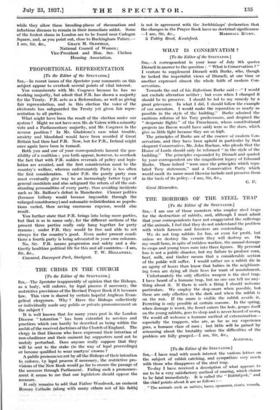WHAT IS CONSERVATISM ?
[To the Editor of the SPECTATOR.]
Sin,—A correspondent in your issue of July 9th quotes Disraeli in answer to the question : " What is Conservatism ? " I venture to supplement Disraeli with Burke, who, though he lacked the imperialist views of Disraeli, at one time or another expressed almost the whole faith of modern Con- servatism.
Towards the end of his Reflections Burke said :—" I would not exclude alteration neither ; but even when I changed it should be to preserve. I should be led to my remedy by a great grievance. In what I did, I should follow the example of our ancestors. I would make the reparation as nearly as possible in the style of the building." Burke admired the cautious reforms of his Tory predecessors, and despised the " desperate flights " of the Frenchmen, whose constitutional projects (as Bacon would have said) were as the stars, which give us little light because they are so high.
The principles of Burke are of the essence of modern Con- servatism, and they have been upheld in particular by that eloquent Conservative, Mr. John Buchan, who pleads that the House of Lords should only be reformed " in the style of the building." The principles expounded by Disraeli and quoted by your correspondent are the magnificent legacy of Edmund Burke. These indeed " were once the principles which regu- lated Tory statesmen," and a Conservative Party which would merit its name must likewise include and preserve them in the basis of its policy.—I am, Sir, &c.,
G. P.
Great Missendeil.






















































 Previous page
Previous page